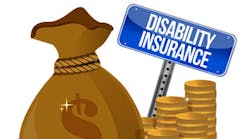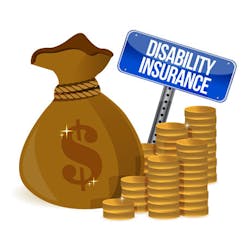What dentists should know about disability insurance, Part 2
READ PART 1 of What dentists should know about disability insurance
Editor's Note: This series of articles will explain the various sources of disability income, what disability insurance is, and what it covers. The articles will also explain how to evaluate personal sources of disability income, and briefly discuss how to compare disability policies. With this information you will be able to make an informed decision about whether you have a need for individual disability insurance and, if so, which features are most important to you.
Are you covered by disability benefits at work?
Find out exactly what benefits your employer offers in the event of a disabling illness or injury. Most employers allow some short-term sick leave, which might last from a few days to as much as six months, depending on employer policy and duration of employment. In Hawaii, New Jersey, New York, Rhode Island, and Puerto Rico, state law requires most employers to provide disability benefits for up to 26 weeks. In California, most employers must provide coverage for up to 52 weeks.
Check with your company benefits department to see if you are covered, and if so, what is available to you. Find out how long you must wait before benefits begin (elimination period) and how long payments (benefit period) will continue during your disability. Also find out whether your employer’s plan takes other disability coverage (such as government programs) into account when calculating what your long-term disability pay will be. Ask for a booklet that describes the disability coverage your company offers. These offsets can further reduce the amount you receive from your coverage, and as previously mentioned, being taxable if employer paid. Incidentally, there are remedies if one knows where to find them.
What about Social Security disability benefits?
Most salaried workers in the US participate in the federal government’s Social Security program. Social Security is best known for its retirement benefits, but it also administers disability benefits. In 1989, $22.9 billion in Social Security disability payments were sent to 4.1 million Americans.
Your salary and the number of years you’ve been covered under Social Security determine how much you can receive. In 2005, the average monthly payment for all disabled workers was $587; the average monthly payment for a family consisting of a disabled worker, spouse, and one or more children was $1,022. You should know:
• You are eligible for benefits after you have been disabled for six months and if the disability is expected to last at least 12 months. Claim processing may take up to three months, so file as soon as possible.
• Social Security payment may be reduced by disability entitlements under other government programs because total combined payments under Social Security, workers’ comp, civil service, and military programs generally cannot exceed 80% of average pre-disability earnings. A government pension may reduce Social Security disability payments.
• Eligibility is based on being unable to perform any gainful employment, not just the job you were performing at the time the disability began (and the reason for a 72% rejection).
• After 24 months of benefits, recipients qualify for Medicare. If you want the medical insurance portion of Medicare, in addition to hospital coverage, you must enroll and pay a monthly premium.
• Social Security disability payments are subject to federal income tax if your adjusted gross income plus non-taxable interest income and half of your Social Security benefits exceed $25,000 (if you file tax returns individually) or $32,000 (if you file jointly).
Despite some limitations in the program, Social Security disability payments can be an important segment of your income should you suffer a disabling illness or injury. Contact your local Social Security office for an estimate of the disability benefits to which you’d be entitled.
Are you eligible for other disability income?
There may be many other potential sources of income if you become disabled:
• Workers’ compensation benefits, if you suffer an accident at work or an illness that directly results from your employment
• Veterans Administration pension disability benefits for eligible veterans
• Civil service disability pay for federal or state government workers
• Black lung program for miners
• State vocational rehabilitation programs
• Group union disability coverage
• Automobile insurance if disability results from an auto accident
• Private insurance, such as credit disability insurance, that covers monthly loan payments when you are disabled
• Supplemental Security Income (SSI) for persons with low income and limited assets
• Medicaid, also for persons with low income and limited assets
The availability and extent of these and other programs vary widely in different locations. But because one or more may be an important source of income should you become disabled, it’s important to determine whether you’re eligible. If you are, you should also find out how long you have to wait before benefits begin and how long benefits will be paid. And of course, your own resources—the savings you’ve put aside through the years—are another valuable source of income.
ALSO BY LARRY SCHNEIDER:When doesn’t the own-occupation definition of total disability work? What dentists need to know
Stay tuned for Part 3 of "What dentists should know about disability insurance," coming soon.


